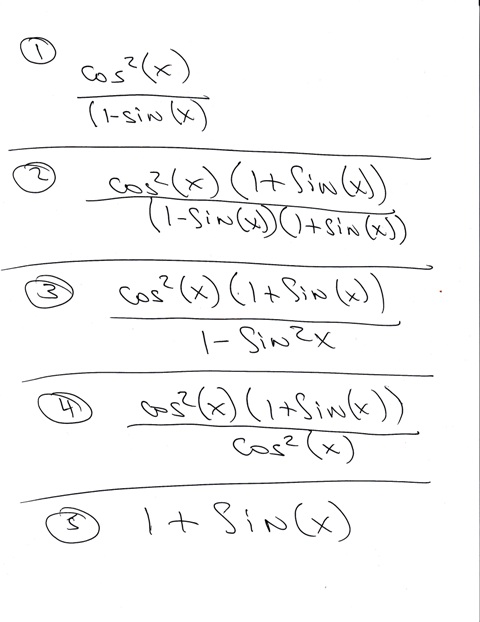SOLUTION: Rewrite the expression (cos^2x)/(1-sin x) so that there is no fraction.
Algebra.Com
Question 552512: Rewrite the expression (cos^2x)/(1-sin x) so that there is no fraction.
Answer by Theo(13342) (Show Source): You can put this solution on YOUR website!
multiply numerator and denominator by 1 + sin(x)
you get:
cos^2(x) * (1 + sin(x) divided by:
(1 - sin(x)) * (1 + sin(x))
this comes out to be:
cos^2(x) * (1 + sin(x) divided by:
(1 - sin^2(x))
since 1 - sin^2(x) = cos^2(x), then you get:
cos^2(x) * (1 + sin(x) divided by:
cos^2(x) which turns out to be:
1 + sin(x)
see the attached picture for hand drawn calculations:

RELATED QUESTIONS
write the expression in terms of sine and cosine, and simplify so that no quotients... (answered by DrBeeee)
How to rewrite the expression cos(x)+sin(x)cos(x)/(1+sin(x))in simplied... (answered by lynnlo)
Identify the expression that completes the equation so that it is an identity.
cos... (answered by Alan3354,Edwin McCravy)
simplify the expression... (answered by stanbon)
Simplify so that the expression is an identity.... (answered by MathLover1)
Verify the expression: cos^3 + sin^2 cos = cos
Cos^3 + sin^2 cos = cos
Cos x cos^2 + (answered by Alan3354)
sin(A+B) = sin A cos B + cos A sin B
cos(A+B) =... (answered by vleith)
So i need to solve the trigonomic equation sin(2x) + sin(x) = 0. So i use sin(2x)'s... (answered by jsmallt9)
Show that sin 2x/sin x=2cos x (Hint sin 2x = sin (x+x))
Use the sum formula to for... (answered by Alan3354)
